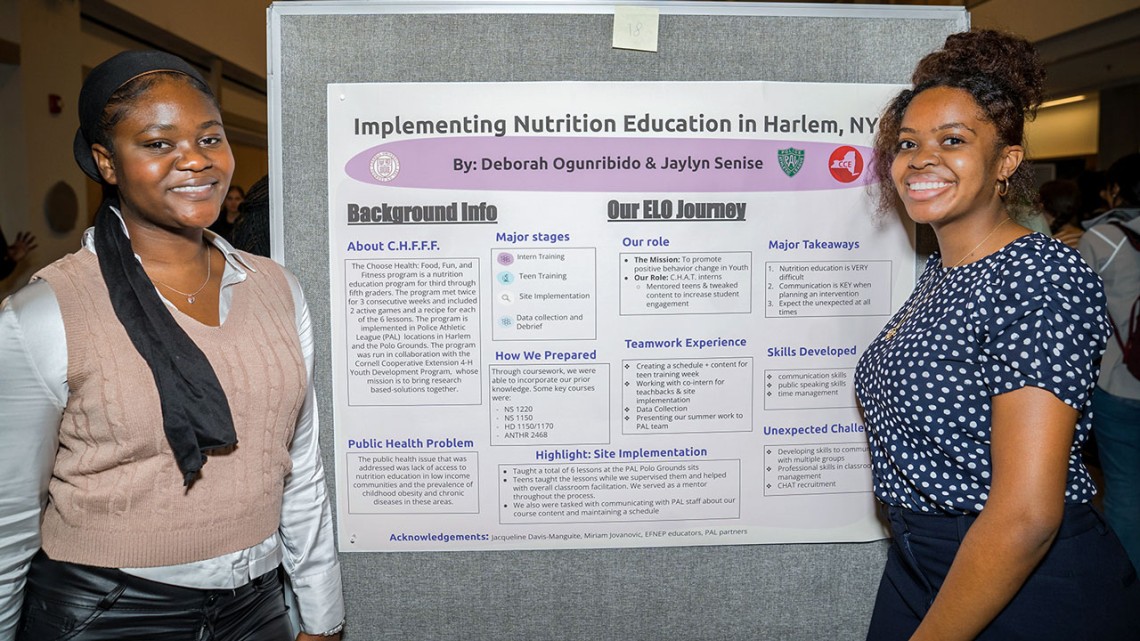
Deborah Ogunribido and Jaylyn Senise present their project at the 2022 Global and Public Health Experiential Learning Symposium.
Students tackle real-world problems in global, public health projects
By Galib Braschler
When George Lee ’24 was studying public health policy this summer in Moshi, Tanzania, he was struck by the impact of outdoor air pollution, which contributes to more than 4 million deaths annually, on the health of local schoolchildren.
“Local health is global health,” said Lee, a global and public health sciences major in the College of Human Ecology. “The impact of local health can be felt by communities across the world.
Lee and his project partner, Rebecca Gordon ’23, concluded in their research that “common policies that aim to mitigate outdoor air pollution are required worldwide.”
He was one of more than 100 students who presented their work on a wide array of projects aimed at improving access to public health everywhere from Tompkins County to Tanzania, as part of the 2022 Global and Public Health Experiential Learning Symposium, held Nov. 11 in Cornell’s Physical Sciences Building.
The annual event is hosted by the Global Health Program in the Division of Nutritional Sciences in the College of Human Ecology and the College of Agriculture and Life Sciences and showcases the work of undergraduate students and students in the Master of Public Health (MPH) program in the College of Veterinary Medicine.
Experiential learning, or the application of classroom lessons to real-world projects, is a requirement for the global and public health sciences majors and global health minors, and students say this is a transformative part of their education.
“This event is a great opportunity to find out about experiential learning opportunities – most people usually only know about global, and this event highlights that in addition to those experiences, we have a lot of local, research-related and community engagement opportunities available in public health at Cornell,” said Audrey Lewis ’23, a member of the Global Health Advisory Board.
“When we designed the major with the curriculum requirement of experiential learning, it was a very deliberate choice to provide students with an opportunity to discover the rewards and the challenges within their experiential learning opportunity and deepen their understanding of public health,” said Patricia Ann Cassano, director of the Division of Nutritional Sciences. “It’s incredible to witness the ways all of you are connecting the things you’re learning in the classroom to a real-world setting.”
The symposium featured 16 posters representing work from global health summer programs abroad, while 12 posters and 15 researchers were involved in research through Cornell Cooperative Extension, Cornell in Washington or on campus. An additional 17 students developed their own experiential learning opportunities, finding partners to support the breadth and depth of their proposed project.
Students said each experience came with its fair share of rewards and challenges. They appreciated the opportunity to experience a different culture, receive direct exposure to different aspects of public health and give back by working in rural communities. Challenges included language barriers and learning to navigate foreign health care systems.
Some of the projects presented were the culmination of summer 2022 global health programs, which partnered students with faculty doing research in India, Zambia and Tanzania.
“I’m at Cornell because of public health,” said Liam Ordonez ’23, a human development major who presented his project with government major Shanzai Ikhlas ’24 on a theory of change model for basic health care of incarcerated Black women in California state prisons.
“I fell in love with understanding public health as a system that needs more awareness and funding, and Cornell has been the perfect place to deepen my interest and knowledge base,” Ordonez said. “Events like these are important in shifting our thinking to how we can help the overall community before it’s too late.”
Galib Braschler is a communications specialist in the College of Human Ecology.
Media Contact
Get Cornell news delivered right to your inbox.
Subscribe
